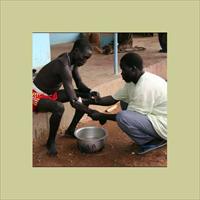GUINEA-BISSAU: Cholera epidemic not yet peaked

The cholera epidemic is still out of control across Guinea-Bissau, with the number of cases doubling in the past three weeks, bringing the total number of people stricken to 10,476 as of 9 October.
There have been 312 new infections in the past two days, according to the UN Children’s Fund (UNICEF), and 181 people have died from the disease.
“The epidemic is not under control. I don’t want to be alarmist, but we haven’t reached the peak and there are still new cases every day,” Daniel Remartinez, emergency coordinator for Médecins Sans Frontières (MSF) Spain, told IRIN from the capital Bissau.
At 7,143, Bissau still has the highest number of cases, followed by Biombo in western Guinea-Bissau with 1,405 cases, and the Bijagos islands, 60km off the coast of the capital, with 441 infections – most of the Bijagos infections contracted in the past few weeks, according to Agostino Betunda, co-director of the Centre for Epidemiology in Bissau.
One in 10 people stricken by cholera are dying from it in the region of Quinara, which neighbours the capital, and one in nine in Bafata in central Guinea-Bissau, due in part to a lack of available treatment, according to Betunda.
MSF is providing treatment in hospitals and health clinics in Bissau, Oio and Biombo regions.
Source found
Epidemiologists in Bissau have traced the first case of cholera to an island in the southern region of Tombali.
“Our research points to Guinean fishermen living in encampments on the island of Campeane near the Guinean border,” Betunda said, adding that he believes the source of the epidemic is related to recent cases of cholera in Guinea. About 40 cases were reported in Guinea in May, according to the World Health Organization (WHO).
“When there are cases in Guinea Conakry, often we have cases here,” said Sylvana Nzirorera, UNICEF deputy representative in Guinea-Bissau.
“The epidemic in Guinea was contained very quickly because the government response was very organised,” she said.
“There are no good sources of water on the island, so people cross the river to look for water. From there, it continued to proliferate throughout the region,” the epidemiology centre’s Betunda said.
Hygiene
Cholera is a recurring problem in Guinea-Bissau, particularly during the rainy months from June to October. A 2005 epidemic killed 400 people and infected over 25,000.
“We must look into the reasons why the country always has outbreaks. It is about lack of water infrastructure, but hygiene practices are also a major cause,” said UNICEF’s Nzirorera.
Nzirorera noted that under a third of Guinea-Bissauans believe that washing their hands will protect them from waterborne diseases like cholera. “This is a major problem,” she said, “Even people who have water do not wash their hands systematically, and those that do, do not use soap.”
UNICEF has put out radio announcements encouraging people to wash their hands regularly throughout the day. A UNICEF report investigating the causes of poor hygiene found that cultural practices play a role. “There is a saying [among some groups] that when a kid has dirty hands, he grows stronger,” said Nzirorera.
The UNICEF report also found that stigma surrounding the disease contributes significantly to prevention efforts.
“Most people in villages think cholera is a shameful disease so they hide it,” Nzirorera explains. “People are starting to link cholera with poor hygiene and they don’t want to be seen as dirty.”
Many people die at home or delay seeking treatment because they are ashamed to admit to the disease, she said.
End in sight
MSF’s Remartinez said the number of infections is expected to peak in the coming weeks, though he said it will be months before the epidemic is over.
“It is difficult to say how many cases we will have at the end. But it will not be over with the end of the rainy season. It will last for some time – probably into November or December,” he told IRIN.
Nzirorera was more optimistic. “The good news today is that Tombali region has not recorded any cases of cholera in the last four days,” she said. “With the rains almost over, we could start seeing the end of the nightmare soon.”
 Back and Next - Back and Next
Back and Next - Back and Next See Also - See Also
See Also - See Also